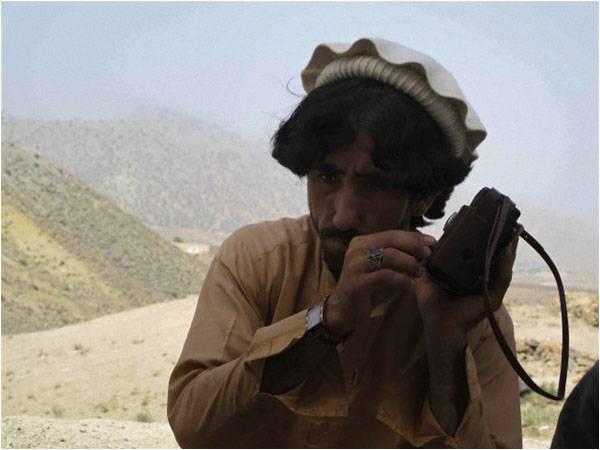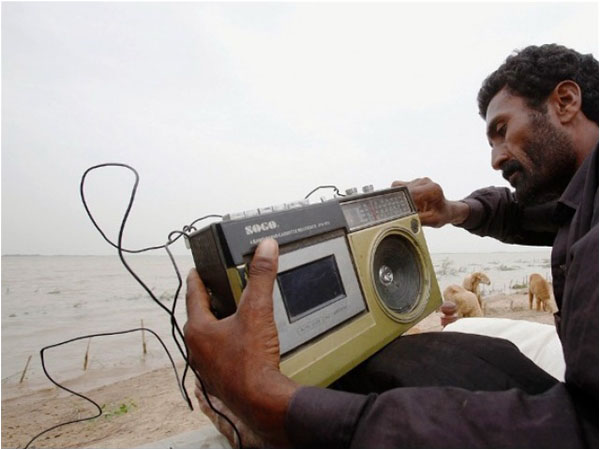
A propaganda radio show run by the Islamic State can be heard in parts of Khyber Pakhtunkhwa and the tribal areas, and there are fears that the transmission would help the terrorist group find new recruits in Pakistan.
The two hour long daily transmission named ‘Caliphate Radio’ is mostly a guide to joining the group that calls itself the Islamic State in Iraq and Syria (IS), or just the Islamic State. It is not clear where the program airs from, but there were reports of similar radio transmissions in eastern Afghanistan, especially from near the Jalalabad city in the Nangarhar province. ISIS has presence in 25 provinces of Afghanistan, according to a United Nations report, and may head south towards the key cities of Helmand and Kandahar, where poppy cultivation and black money could help strengthen its organizational structure.
There are deep worries in Pakistan about the likely presence and influence ISIS in the country and security officials and analysts say the FM radio transmission being heard in FATA and Khyber Pakhtunkhwa could spread the same fear in northern Pakistan as it caused in the Nangarhar and Kunar provinces of Afghanistan.
The radio show urges young men to volunteer temporarily for ISIS to see how it operates, before they make a final decision about whether they want to join the group. “We are asking Muslims to find out for themselves whether the areas under our control are run in line with Allah’s laws,” Hafiz Said Khan, the head of the Pakistan and Afghanistan chapter of ISIS, tells people. “You are not forced to remain with us forever,” says a presenter identified as Waqar.
The program is also used for propaganda, to publicize the ISIS ideology and to criticize the Pakistani and Afghan governments and media. “We are against the apostate armies of Pakistan and Afghanistan and will fight them as long as we breathe,” Hafiz Said Khan is heard saying. “We have killed many of these infidel soldiers and will continue to do that in the future.”
And while Pakistan has vowed to fight the glorification of terrorism in the media in the prime minister’s National Action Plan against terrorism, it is not clear whose responsibility it is to block the transmission and whether it is technically possibly. Mohammad Ali Babakhel, a deputy inspector general in Khyber Pakhtunkhwa Police, says the police has not received complaints about the radio transmission, but it is the responsibility of the Pakistan Electronic Media Regulatory Authority (PEMRA) to jam the broadcast.

No one in the PEMRA office in Peshawar was available to comment on ISIS radio show.
Veteran journalist Rahimullah Yousafzai says the federal government, the army, and intelligence agencies would have to work with PEMRA to block the transmission.
A similar FM radio transmission by the Taliban leader Mullah Fazlullah in Swat from 2006 to 2009 could not be stopped until there was a military operation in the valley. It had such a wide influence that Fazlullah was popularly known as Mullah Radio. The service was relayed by transmitters on motorcycles and trucks.
“It is not very difficult to create and run an FM radio station,” says Dr Faizullah Jan, who teaches Journalism and Mass Communication at the University of Peshawar. “It can be created locally with very little effort, and requires a very few people to operate it.”
A resident of FATA said people tuned in to the transmission on their mobile phones and radio sets. “It is easily accessible,” said Muhammad Saleem. “We don’t know where it comes from, but the sound is very clear.”
A political leader in Charsadda, Nazif Khan, said the broadcast could be heard in his district in Khyber Pakhtunkhwa, as well as Mohmand Agency and Warsak, which are adjacent to the provinces of Afghanistan where ISIS is likely present.
“An ideological battle is more dangerous than an armed conflict,” says Waqar, a presenter in the ISIS radio program. “The infidels inject phony ideologies in the minds of Muslims, which replace the ideology of Jihad. They are the enemies of Islam.” He says he has joined the ISIS radio to counter ‘infidel ideology’.
One show included an interview with a new recruit and a radio transmission expert. Codenamed Shafaq, the young radio enthusiast said this was his first time joining such an organization, and that he would encourage others to do the same. “The black flag of the caliphate was to rise from Afghanistan,” he told his listeners.
Another speaker asked the audience how they would respond when Allah would ask them if they had wasted their youth. “We want Allah’s rule on Allah’s land. We are not brutal and we do not commit crimes,” he says.
A mere radio transmission is not the reason behind the support for ISIS in the region, says Dr Faizullah Jan. Hate speech and extremism are a common phenomenon in Pakistan and Afghanistan. But terrorism is all about spreading fear, and a radio service can be a very useful tool for ISIS to spread fear in the area.
The two hour long daily transmission named ‘Caliphate Radio’ is mostly a guide to joining the group that calls itself the Islamic State in Iraq and Syria (IS), or just the Islamic State. It is not clear where the program airs from, but there were reports of similar radio transmissions in eastern Afghanistan, especially from near the Jalalabad city in the Nangarhar province. ISIS has presence in 25 provinces of Afghanistan, according to a United Nations report, and may head south towards the key cities of Helmand and Kandahar, where poppy cultivation and black money could help strengthen its organizational structure.
There are deep worries in Pakistan about the likely presence and influence ISIS in the country and security officials and analysts say the FM radio transmission being heard in FATA and Khyber Pakhtunkhwa could spread the same fear in northern Pakistan as it caused in the Nangarhar and Kunar provinces of Afghanistan.
"It is very easy to create and run an FM radio station"
The radio show urges young men to volunteer temporarily for ISIS to see how it operates, before they make a final decision about whether they want to join the group. “We are asking Muslims to find out for themselves whether the areas under our control are run in line with Allah’s laws,” Hafiz Said Khan, the head of the Pakistan and Afghanistan chapter of ISIS, tells people. “You are not forced to remain with us forever,” says a presenter identified as Waqar.
The program is also used for propaganda, to publicize the ISIS ideology and to criticize the Pakistani and Afghan governments and media. “We are against the apostate armies of Pakistan and Afghanistan and will fight them as long as we breathe,” Hafiz Said Khan is heard saying. “We have killed many of these infidel soldiers and will continue to do that in the future.”
And while Pakistan has vowed to fight the glorification of terrorism in the media in the prime minister’s National Action Plan against terrorism, it is not clear whose responsibility it is to block the transmission and whether it is technically possibly. Mohammad Ali Babakhel, a deputy inspector general in Khyber Pakhtunkhwa Police, says the police has not received complaints about the radio transmission, but it is the responsibility of the Pakistan Electronic Media Regulatory Authority (PEMRA) to jam the broadcast.

No one in the PEMRA office in Peshawar was available to comment on ISIS radio show.
Veteran journalist Rahimullah Yousafzai says the federal government, the army, and intelligence agencies would have to work with PEMRA to block the transmission.
A similar FM radio transmission by the Taliban leader Mullah Fazlullah in Swat from 2006 to 2009 could not be stopped until there was a military operation in the valley. It had such a wide influence that Fazlullah was popularly known as Mullah Radio. The service was relayed by transmitters on motorcycles and trucks.
“It is not very difficult to create and run an FM radio station,” says Dr Faizullah Jan, who teaches Journalism and Mass Communication at the University of Peshawar. “It can be created locally with very little effort, and requires a very few people to operate it.”
A resident of FATA said people tuned in to the transmission on their mobile phones and radio sets. “It is easily accessible,” said Muhammad Saleem. “We don’t know where it comes from, but the sound is very clear.”
A political leader in Charsadda, Nazif Khan, said the broadcast could be heard in his district in Khyber Pakhtunkhwa, as well as Mohmand Agency and Warsak, which are adjacent to the provinces of Afghanistan where ISIS is likely present.
“An ideological battle is more dangerous than an armed conflict,” says Waqar, a presenter in the ISIS radio program. “The infidels inject phony ideologies in the minds of Muslims, which replace the ideology of Jihad. They are the enemies of Islam.” He says he has joined the ISIS radio to counter ‘infidel ideology’.
One show included an interview with a new recruit and a radio transmission expert. Codenamed Shafaq, the young radio enthusiast said this was his first time joining such an organization, and that he would encourage others to do the same. “The black flag of the caliphate was to rise from Afghanistan,” he told his listeners.
Another speaker asked the audience how they would respond when Allah would ask them if they had wasted their youth. “We want Allah’s rule on Allah’s land. We are not brutal and we do not commit crimes,” he says.
A mere radio transmission is not the reason behind the support for ISIS in the region, says Dr Faizullah Jan. Hate speech and extremism are a common phenomenon in Pakistan and Afghanistan. But terrorism is all about spreading fear, and a radio service can be a very useful tool for ISIS to spread fear in the area.

